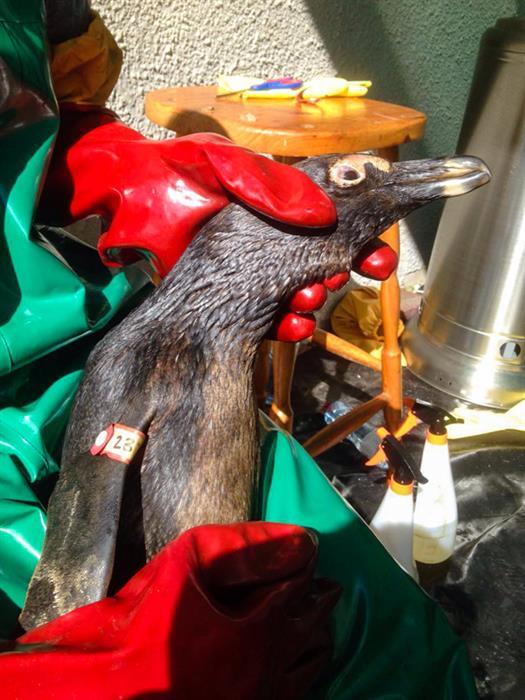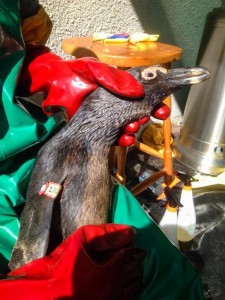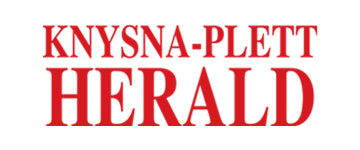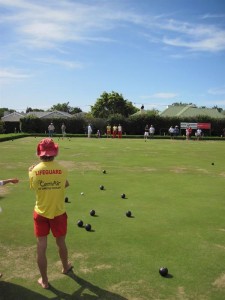

The 100-litre oil spill that occurred during a ship-to-ship transfer on August 16, and the 5km resultant slick that affected about 150 African penguins, is considered by SA National Parks to be a national environmental disaster. Photo: Supplied
Plettenberg Bay residents rallied to assist with the clean-up of some 150 African penguins, including abandoned chicks, rescued since they fell victim to the effects of an oil spill in Algoa Bay.
The first birds were rescued on Tuesday, August 16 and a collaborative rescue operation by marine rangers from the Addo Elephant National Park, the National Sea Rescue Institute (NSRI) and the Southern African Foundation for the Conservation of Coastal Birds (Sanccob) took place over the weekend of August 21 and 22.
According to Dr Mark Brown, programme director of the Nature’s Valley Trust and board member of the Plett Hope Spot, there are two rehabilitation centres working on the crisis: South African Marine Rehabilitation and Education Centre (Samrec) in Port Elizabeth, and Sanccob at Cape St Francis.
The Plett Hope Spot, one of only five international marine conservation areas in South Africa, is assisting Sanccob, at their request.
It has been reported that the 100-litre oil spill that occurred during a ship-to-ship transfer on Tuesday, August 16, and the 5km resultant slick, is considered by SA National Parks (SANParks) to be a national environmental disaster.
“The African penguin is the only penguin species to naturally occur on the African continent. It was once one of South Africa’s most abundant seabirds, but has suffered a massive population decline. In the early 20th Century the population was estimated at 1-million breeding pairs; today the total estimate is less than 25 000 breeding pairs, with only 19 284 breeding pairs recorded in South Africa in 2015 (South African Department of Environmental Affairs: Oceans and Coasts),” according to Sanccob.
“The present population represents approximately only 2,5% of its prevalence some 80 years ago and, most worryingly, the decrease is continuing. Due to the rapid decline, this indicator species, which breeds at 29 locations in South Africa and southern Namibia, was listed as endangered on the IUCN red list in 2010.”
The Plett Hope Spot has mobilised staff from several local NGOs and conservation groups, including staff and in some cases volunteers from the Nature’s Valley Trust, Orca Foundation, Brackenburn Crew and African Edu-Eco Wizard.
“Dr Gwen Penry, who heads up the Plett Marine Stranding Network, and who is current chairperson of the Plett Hope Spot, is also assisting. Plett is one possible site where BirdLife South Africa and other partners (including myself) are considering developing an artificial land-based breeding colony for the African penguin, so Plett locals are keen to help as much as possible,” said Brown.
According to Brown, Plett is at this stage not at any risk of being affected by the spill. “It was by all accounts a contained spill that has already been treated and so won’t spread. It is plausible that we might see the odd oiled bird come to shore here, but that’s because they have swum here from PE. Most likely that won’t happen either though,” he said.
Upon landing at Sanccob, oiled birds receive a few days of intensive care to improve their strength and hydration, while the chicks are cared for in separate enclosures.
Nada Manengela, marketing and fundraising coordinator for Sanccob, said, “Most of the penguins are heavily oiled, with some having as much as 90% of their bodies covered in oil. Oil breaks down the natural waterproofing of a penguin’s feathers and makes it unable to regulate its body temperature, both in the ocean and on land, often leading to hypothermia, if not treated.
“Oil also causes skin and eye irritation. A natural reaction for penguins is to preen their feathers to remove the oil, which can result in ingestion of oil, ultimately leading to ulcers, a reduced immune system and organ failure. Birds admitted to the centre are usually dehydrated, stressed and weak.”
The abandoned penguin chicks, having yet to reach fledgling age, are not yet able to hunt for fish and would otherwise starve in the colony without their parents’ care. “On admission, the chicks are placed on a regime of fish formula, vitamins and fish fillets to ensure they gain weight appropriately for their age. Hand-rearing of these chicks is likely to take eight weeks or more, until they have grown into young juveniles, able to care for themselves in the wild,” explained Manengela.
“Removing oil from a penguin’s feathers begins with applying a solution that breaks down the oil, before the bird is cleaned with a small brush and washed in a warm soapy solution.
The bird is then rinsed thoroughly to remove all the soap from its feathers, helping it to regain its natural waterproofing. The entire washing and rinsing process takes between one and two hours, before the birds are placed in drying pens under infrared heat lamps that speed up the drying process,” said Manengela.
The rescued birds will all be washed over the course of the next two to three weeks, while the staff and volunteers are tasked with ensuring that they are fed, hydrated and swum so as to regain the natural waterproofing of their feathers.
Offshore Adventures in Plett coordinated an effort under the Plett Hope Spot banner to collect towels and newspapers needed for the rehabilitation effort. Masses of towels and newspapers were collected and sent to Sanccob over the weekend of August 26.
Article by Knysna-Plett Herald











